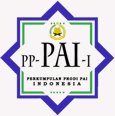The Role of Islamic Higher Education in Promoting Peace: A Case Study of Fatoni University, Thailand
Abstract
Keywords
Full Text:
PDFReferences
Abdulhamid A. Abu Sulayman.(2007). Revitalizing higher Education in the Muslim World.USA :
The International Institute of Islamic Thought.
Abdulhamid A. AbuSulayman.(2011).The Qur’anic Worldview : A Springboard For Cultural
Reform. London/Washington: The International Institute of Islamic Thought.
Abdulhamid A. Abu Sulayman.(1994). Islamazation: Reforming Contemporary Knowledge.
USA : The International Institute of Islamic Thought.
Anwar Koma and Ekkarin Tuansiri.(2022).Who are the Patani Peace Influencers? Exploring
from Perspectives of Civil Society in Southern Thailand. ASI-Asian Social Issues
Vol. 15 No. 1 (2022): January - February.Retrieved 10 December 2021.
from: https://doi.org/10.48048/asi.2022.250031.
Arhama Hayeesama-ea.(2021).The Roles of Majlis ilmi of Fatoni University in Propagating
Islamic Sciences and Promoting Knowledge Culture Towards Community. Unpublished
Master Thesis, Fatoni University.
Aryud Yahprung.(2014).Reform Movement of Shaykh Dr.Ismail Lutfi Chapakia Al-Fatani.
Unpublished Ph.D.thesis, International Islamic University Malaysia.
Bukuri Sejno.(2021). Fundamentals of Islam. Institute of Knowledge Integration. Retrieved on
December 28,2021.https//elearning.ikiacademy.org/course/view.php?id=28.
Chaiyot Yongcharoenchai. (n.d.). Teaching peace amid death in the deep Southmost. Bangkok
Post. Retrieved on 12 December 2021.
https://www.bangkokpost.com/thailand/special-reports/549611/teaching-
Fatoni University.(2019).Undergraduate Prospectus 2019. Songkhla: Chan Muang.
Ghulam Nabi Saqeb.“The Islamization of Education since 1977 Makkah Education
Conference: Achievements Failures and Tasks ahead .Muslim Education
Quarterly,Vol.18,No.1.(2000).The Islamic Academy, Cambridge,U.K.pp.65-79.
Hafiz Salae. (2017). The Political Accommodation of Salafi-Reformist Movements in
Thailand. Unpublished Ph.D.Thesis, University of Leeds.
Hasan Langgulong.“Islamic Education and Human Resource Development”. Muslim Education
Quarterly, Vol.18,No.1(2000).The Islamic Academy, Cambridge, U.K.pp.39-64.
Ismail Lutfi, Chapakiya. (2012).Islam:A religion of Peace.7th edition.Pattani : Assalaam
Institute.
Loreta Navarro-Castro and Jasmin Nario-Galace,(2021). Peace Education: A Pathway to
a Culture of Peace.Philippines: Center for Peace Education, Miriam College.
Madinah Al-Salaam. (2022). Retrieved onDecember 28,2021.https// www.madinahalsalam.com.
Maimun Aqsha Lubis.Effective Implementation of the Integrated Islamic Education.
GJAT. June 2015, Vol 5 ISSUE 1/59.Retrieved on December 28,2021.www.gjat.my.
Mustafa Omar Mohammed,(2012).”Islamic Educational Model : The Significance of Mantiq
and its Inplications”.Charting New Directions for Muslim Universities. National Higher
Education Research Institute : Universiti Sain Malaysia.
Che Noraini Hashim.(2014).Issues in Values-Based Education in Malaysia.Gombak :IIUM Press.
Rosnani Hashim.(1997).“The Construction of an Islamic-Based Teacher Education Programme”.
Muslim Education Quarterly. 1997.14(2). Cambridge, UK : The Islamic Academy.
Solihah Hayeesama-ae.(2020). The Concept of Education in Islam. 3rd edition. Songkhla :
Baitul-Printing.
The Noble Qur’an (online).(n.d.) English Translation(Yusuf Ali).Retrieved on December 28,2021.from https://quran.com.
DOI: http://dx.doi.org/10.24014/potensia.v8i2.21606
Refbacks
- There are currently no refbacks.
Copyright (c) 2023 POTENSIA: Jurnal Kependidikan Islam

Potensia: Jurnal Kependidikan Islam
E-ISSN: 2442-5605
Published By:
Fakultas Tarbiyah dan Keguruan Universitas Islam Negeri Sultan Syarif Kasim Riau, Indonesia
Mailing Address:
Jl. H.R Soebrantas Km. 15 No. 155 Kelurahan Simpang Baru Kecamatan Tuah Madani, Pekanbaru, Riau, Indonesia
email: potensia.ftk@uin-suska.ac.id
Indexed By:
POTENSIA: Jurnal Kependidikan Islam is licensed under a Creative Commons Attribution 4.0 International License.

_-_Copyy2_(1)_copy1.jpg)



.jpg)
.png)
.jpg)
.jpg)




